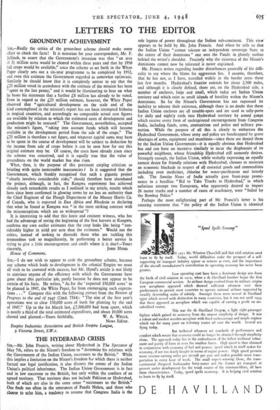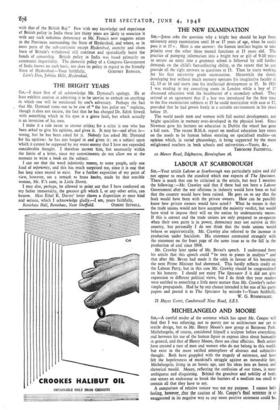THE HYDERABAD CRISIS
SIR,—Mr. John Francis, writing about Hyderabad in The Spectator qf May 7th, refers to the Nizam's freedom to "determine his relations with the Government of the Indian Union, successors to the British." While this implies a limitation on the Nizam's freedom for which there is neither factual nor legal justification, it also distorts the extent of the Indian Union's political inheritance. The Indian Union Government is in fact and in law successor to the British, but only within the confines of an agreed territory. That territory does not include Pakistan or Hyderabad, both of which are also in the same sense "successors to the British." One finds too often in the utterances of Pandit Nehru, and those who Choc= to echo him, a tendency to assume that Congress India is the sole legatee of power throughout the Indian sub-continent. This view' appears to be held by Mr. John Francis. And when he tells us that the Indian Union "cannot tolerate an independent sovereign State in the centre of their dominions " one sees the Pandit in ghostly outline behind the writer's shoulder. Precisely why the existence of the Nizam's dominions cannot now be tolerated is never explained.
Mr. Francis writes regarding border disturbances generally of his diffi- culty to say where the blame for aggression lies. I assume, therefore, that he has not, as I have, travelled widely in the border areas these last few months. Hyderabad's frontier extends for about 2,500 miles, and although it is clearly defined, there are, on the Hyderabad side, a number of enclaves, large and small, which today are Indian Union territory and which exist as small islands of hostility within the Nizam's dominions. So far the Nizam's Government has not expressed its inability to tolerate their existence, although there is•no doubt that these Indian Union enclaves are all trouble-spots and are used as sally-ports for daily and nightly raids into Hyderabad territory by armed gangs which receive every form of underground encouragement from Congress India, including funds, arms, ammunition and police and military pro- tection. While the purpose of all this is clearly to embarrass the Hyderabad Government, whose army and police are handicapped by grave shortages of arms, equipment and munitions—since these are denied them by the Indian Union Government—it is equally obvious that Hyderabad has and can have no incentive similarly to incur the displeasure of its powerful neighbour, whose friendship Hyderabad still earnestly desires. Strangely enough, the Indian Union, while verbally expressing an equally earnest desire for friendly relations with Hyderabad, chooses to maintain an economic blockade in respect of all essential goods and commodities including even medicines, chlorine for water-purification and latterly salt. The Sunday News of India actually gave front-page promi- nence to a headline "Bid to Take Trucks to Hyderabad," in which nefarious attempt two Europeans, who apparently desired to import 26 motor trucks and a number of cases of machinery, were "foiled by the Bombay Police."
Perhaps the most enlightening part of Mr Francis's letter is his amazing statement that "the policy of the Indian Union is identical
with that of the British Raj." Few with any knowledge and experience of British policy in India these last thirty years are likely to associate it with any such nebulous democracy as Mr. Francis now suggests exists in the Provinces surrounding the State of Hyderabad, and where, as in most parts of the sub-continent except Hyderabad, anarchy and chaos born of Britain's withdrawal still continue and sporadically burst the bonds of censorship. British policy in India was based primarily on communal impartiality. The domestic policy of a Congress Government of India knows no such basis, nor does its policy in regard to the friendly State of Hyderabad.—Your faithfully, GODFREY BARR.ASS. Lion's Den, Jubilee Hills, Hyderabad.



































 Previous page
Previous page